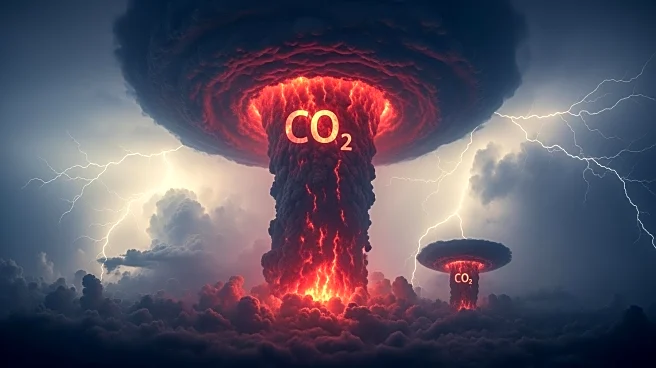What's Happening?
The United Nations weather agency has reported a record increase in carbon dioxide levels in the atmosphere last year, contributing to more extreme weather events. The World Meteorological Organization (WMO) highlighted that CO2 growth rates have tripled
since the 1960s, reaching levels not seen in over 800,000 years. Emissions from fossil fuels and wildfires are exacerbating the climate cycle, with natural systems like oceans and forests losing their ability to absorb these gases. The report indicates an annual increase of 3.5 parts per million from 2023 to 2024, the highest since measurements began in 1957. This rise in greenhouse gases is linked to more severe weather patterns and poses a threat to global climate stability.
Why It's Important?
The record high CO2 levels underscore the urgent need for action to address climate change. The increase in greenhouse gases is driving more extreme weather, impacting ecosystems, economies, and communities worldwide. The findings highlight the limitations of natural systems in absorbing emissions, signaling potential tipping points in the carbon cycle. This situation calls for intensified efforts to reduce emissions and transition to sustainable energy sources. Policymakers, businesses, and civil society must collaborate to implement strategies that mitigate climate impacts and promote environmental resilience. The report serves as a critical reminder of the global challenge posed by climate change and the necessity for coordinated action.
What's Next?
The WMO's report may prompt renewed discussions at the upcoming U.N. climate conference, focusing on strategies to curb emissions and enhance climate resilience. Governments and organizations may prioritize investments in renewable energy and carbon capture technologies to address the rising CO2 levels. The international community may also explore policies that support sustainable practices and reduce reliance on fossil fuels. As the world grapples with the implications of climate change, stakeholders will need to balance economic growth with environmental sustainability, ensuring a viable future for generations to come.
Beyond the Headlines
The record CO2 levels raise ethical and cultural questions about humanity's responsibility to protect the planet. The impact on vulnerable communities and ecosystems highlights the need for equitable solutions that address climate justice. The report may influence public awareness and drive cultural shifts towards sustainability, encouraging individuals and organizations to adopt environmentally friendly practices. The long-term implications of unchecked emissions could lead to irreversible changes in the Earth's climate, underscoring the importance of proactive measures to safeguard the environment.















